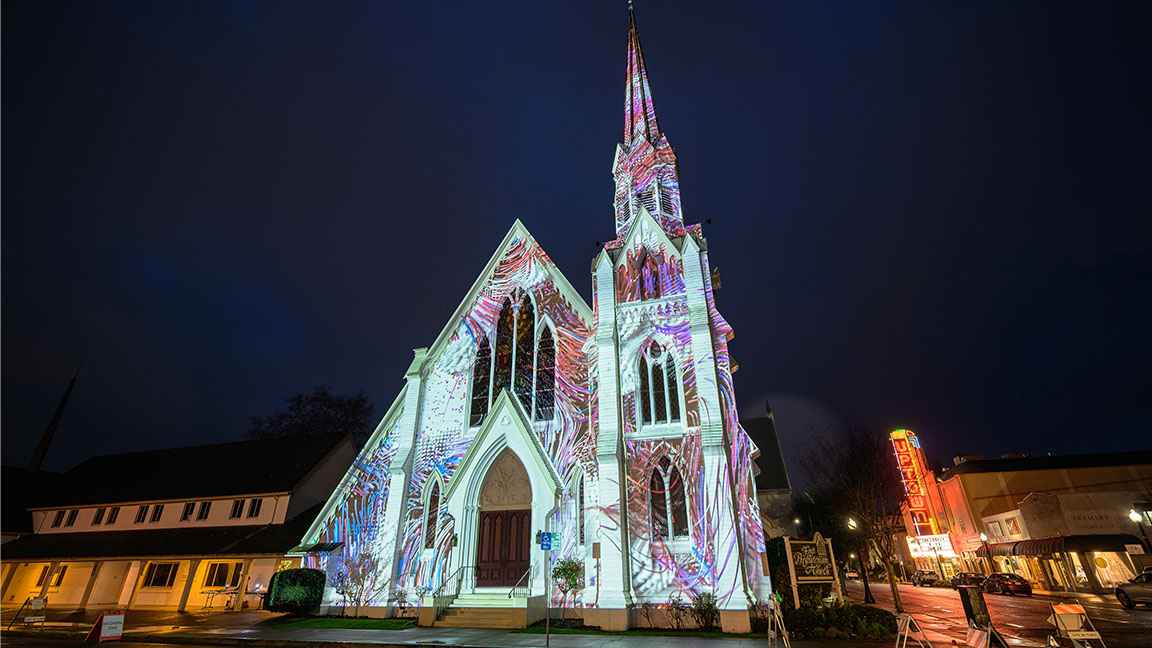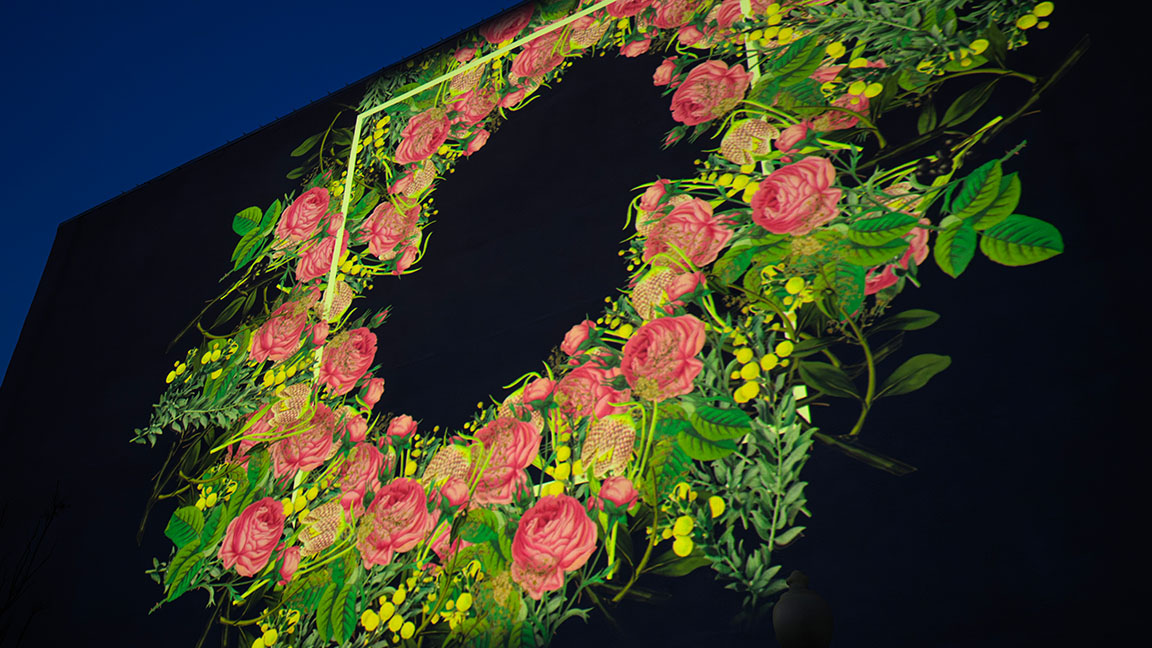Something to See: Panasonic Delivers Next-Level Projection Mapping at Napa Festival
Artists use historic buildings as their canvases—along with blending technology to avoid trees and other obstacles.

A daily selection of features, industry news, and analysis for AV/IT professionals. Sign up below.
You are now subscribed
Your newsletter sign-up was successful
The Napa Lighted Art Festival, which took place in downtown Napa, CA, from Jan. 20-Feb. 18, celebrated creative arts, bright lights, and the technology that brings it altogether. The first nine nights of the festival saw three Napa buildings—First Presbyterian Church, Historic Napa County Court House, and Native Sons—become canvases for artists' creativity. To project their creations onto the iconic buildings, A3 Visual turned to Panasonic projectors.
[How Panasonic Connect Il-LUMA-nates Binghamton]
"It's an outdoor projection mapping festival that they do every year in Napa," explained Tim Morin, strategic account manager, live entertainment for Panasonic Connect. "They bring in artists from around the country and around the world to project on historic buildings. It really brings the community together, especially in Napa. While it's already such a tight-knit community, this event gives them some of the cultural exposure typically reserved for big cities."
Panasonic Connect is no stranger to the Napa Lighted Art Festival, nor working with A3 Visual. Known for its event production and immersive services with locations in Los Angeles, San Francisco, and Miami, A3 Visual recently teamed with Morin on the "Let's Glow SF" holiday event in December. And much like that event, the Napa Lighted Art Festival was illuminated by Panasonic PT-RQ35KU 4K laser projectors, which offer 30,000-lumen brightness.
"We all have our strong points, but some of the key factors that differentiate Panasonic projectors from other manufacturers are their reliability, clarity, and quality," Morin said. "So, when it comes to outdoor projection mapping, just the image you get from a unit like the RQ35 or RQ50 does set it apart from other projector models."
The projectors—which produce high-quality images and colors while simplifying the projection of artwork onto the twists and turns of large, city buildings—were double stacked for each of the three buildings, allowing artists to create content that illuminates the entire building and bring stagnant architecture to life in an all-new light. One of the challenges with the setup was that there was no way to use a typical outdoor enclosure, so A3 Visual used a couple of Conex containers.
"They double stacked shipping containers," Morin explained. "They had all the power distros and everything there because that's the only way they could do it safely."
A daily selection of the top stories for AV integrators, resellers and consultants. Sign up below.
A3 Visual also had one other enclosure that was large enough to handle two projectors. "So, they had that outdoor enclosure for one of the other buildings, and the third one was ground supported Connex container as well," Morin added. "[Outdoor projection] is not typically designed to have three-phase power sitting there or to have proper pathways for cables. You have to makeshift what you're going to do. And a Conex container makes it kind of easy—you can run all the cables in there, you can run the projectors in there. They're large enough for venting, so it is a nice, secure way to do it."
[Classroom Projectors: What You Need to Know for the First Day of School]
The Conex containers eliminated concern of poor weather, since everything from the projectors to the power to the distribution was consolidated to one sheltered space. Of course, Mother Nature has other obstacles than the weather … like trees.

Morin explained how the projectors seemingly dodged trees that they couldn't simply chop down for one event. "It'll be the blending. We calculate our overlap, and then we do some geometry management to it, and we square it back off," he said. "It's challenging, but the ability to blend the way Panasonic projection does is second to none. When you start doing stuff like that and you're blending on a building around a tree, we have that ability that separates us."
The artists used Modulo Pi media servers and are very involved with how the content is displayed. A3 Visual provided a template, and the artists created the content based off that. They can dictate brightness or when to dim colors, playing an interactive role with the producers to bring everything together.
Speaking of interactive, one of the more memorable projections was one that visitors could have some connection with themselves. "One of the buildings had a very cool installation where there was a QR code," Morin recalled. "You could take your phone, scan the QR code, you'd put in a message, and it would turn [that message] into virtual flowers. The different type of virtual flowers would create this collage and this mosaic on the building. So, every time someone came up and just put in a different phrase, it would change. It was very interactive and unique."
[Powerful Projection Mapping Provides Engaging Spectacle for Charity]
This was Morin's first trip to the Napa Lighted Arts Festival since joining Panasonic Connect just over a year ago. Like many of the spectators, he was blown away. "The emotional connection you get when you see a building like that," Morin reflected. "You see it every day and it's just a big slab of brick. But then you walk by it the next night, and it just takes your breath away because you're like, 'I didn't even know this was there.' You start getting a new appreciation for your town."

Wayne Cavadi is the senior content manager of Systems Contractor News. Prior to taking a leap into the Pro AV industry, Wayne was a journalist and content lead for Turner Sports, covering the NCAA, PGA, and Major and Minor League Baseball. His work has been featured in a variety of national publications including Bleacher Report, Lindy's Magazine, MLB.com and The Advocate. When not writing, he hosts the DII Nation Podcast, committed to furthering the stories and careers of NCAA Division II student-athletes. Follow his work on Twitter at @WayneCavadi_2 or the SCN mag Twitter page.
